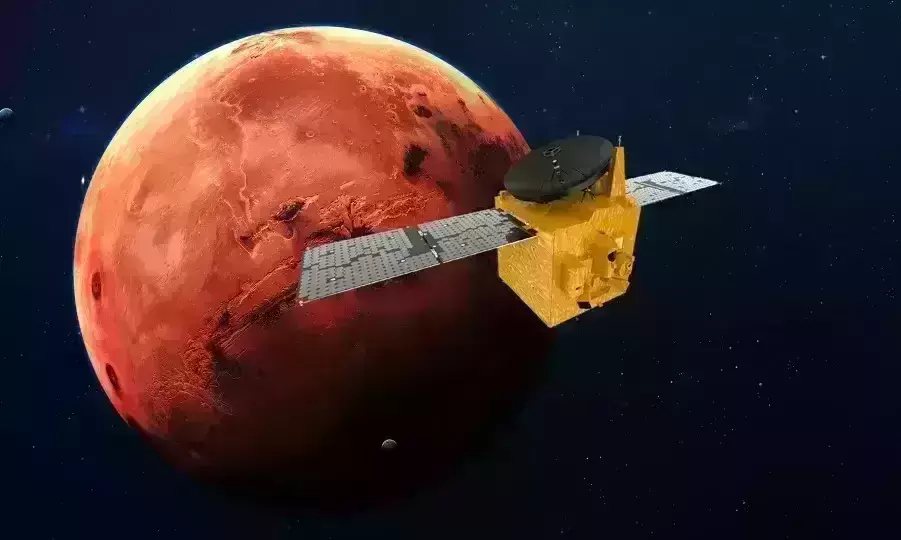

UAE transforms into a significant 21st-century space nation
text_fieldsOne of the most significant successes UAE has gained in the recent past is the successful Mars Mission. The mission, executed through International Cooperation, culminated on February 9th, 2021 when the Hope Probe was successfully placed in an orbit around Mars at 7.40 emirates time. The Mars mission satellite was designed, developed and launched through an International collaboration involving various universities in the USA, Japanese space agency and UAE space agency. It marks a national success and international recognition for UAE and depicts its transition from a business-driven to a technically advanced nation.
The UAE has become the fifth competent nation to do this space flight adventure after leading countries like the USA, Russia, the European Union and India. Further manoeuvring over the mission will be carried out until it reaches a 55-hours orbit with an apogee and perigee of the order of 22000 km to 43000 km above Mars. The mission is designed to have scientific explorations of Martian atmosphere and study how basic elements and water vapour transport occurred over the Mars billions of years back.
The initial orbit of the satellite 'Hope', now weighing 550 Kg roughly, will have the closest distance of 1000 km and farthest 49380 Km with an orbital period of 40 hours. It was an auspicious moment in the history of UAE to have received the orbit entry message in the evening taking 11 minutes to traverse 190 million kilometre distance of separation between Mars and Earth. Mr Omran Sharf was the Hope project's mission director and works with Mohammed Bin Rashid Space Centre, UAE. In this context, it was relevant that the UAE team selected the slogan as 'Impossible is possible'.
It is worth noting that the nation didn't have a space industry business for a long time, but the modern management approach and collaborative effort through various universities and agencies made ideas into a viable project through seven years of work. The Chair of UAE space agency and Minister of Space and Advanced Technology said, "The weight of seven years has been lifted off my shoulders".
From an International viewpoint, this success has got high relevance. It is not easy to become a nation at fifth rank superseding China by a few days. China's Tianwen-1 orbiter is on its way to Mars and is expected to enter Mars orbit on February 10th, 2021 into the Polar orbit and will look into the planet's ionosphere. Additionally, international presence in Mars is going to increase by the addition of NASA's Perseverance Rover mission which intends to place a surface moving Robot for deeper explorations. This is expected to happen on February 18th, 2021, and was launched on July 30th, 2020. The Perseverance is expected to have a life of one Mars year, about 687 Earth days, with full performance and observation sequence of the atmosphere.
But as space experts view, the success of UAE is commendable in a sense they could organize this space project and get it executed in different laboratories, industries and agencies with a fairly good budgetary control, starting from satellite contract to launch and its operational support. India can be proud that we have a friendly country in our neighbourhood with all enthusiasm to jump into futuristic space programs, enabling this region to be a prominent scientific corner of this world.
(The author is a former ISRO senior scientist and Aramco-endowed Chair of technology. He has authored 300 scientific papers and has received several awards for Science and Technology including PARAM. Currently, he is a distinguished Professor visiting National Institute of Advanced Studies, Bangalore.)






















